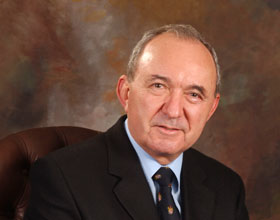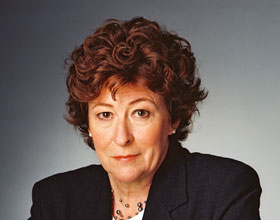  |
| HOME | THIS ISSUE | CALENDAR | PATENTS | BACK ISSUES | < BACK | NEXT > |
Dodd Prize to honor human rights advocatesby Karen A. Grava - October 3, 2005
|
||||
|
Two attorneys who have spent their careers fighting for human rights will share the Thomas J. Dodd Prize in International Justice and Human Rights on Oct. 17.
Those to be honored are Richard J. Goldstone, a retired justice of the Constitutional Court of South Africa, and Louise Arbour, a Canadian who has served on the high court in Canada and is now United Nations High Commissioner on Human Rights. They will receive the prize on the plaza of the Thomas J. Dodd Research Center, weather permitting, at 11 a.m. Both have served as prosecutors at the International Criminal Tribunal for the former Yugoslavia, which Goldstone helped establish. “The University of Connecticut has long been committed to making human rights a focal point of concern for our students and for all those we serve,” says University President Philip E. Austin. “The Dodd Prize represents an important opportunity to reflect on Sen. Thomas Dodd’s legacy in this area and to highlight the contributions of exceptional leaders in our own time. We are greatly honored to have two outstanding figures in the international human rights community join us to receive this award.” The prize is named for the late Thomas Dodd, who was a senator from Connecticut from 1959 to 1971 and served as executive trial counsel at the Nuremberg trials following World War II. He is the father of Sen. Christopher Dodd (D-Conn.). Both Dodds have worked on behalf of human rights in the United States and overseas. The $75,000 prize will be split between the two winners and will be presented by Sen. Christopher Dodd. Awarded every two years, the prize was first presented in 2003 to Prime Minister Tony Blair of the United Kingdom and Taoiseach (Prime Minister) Bertie Ahern of Ireland. “It’s a true honor to award these two exceptional human rights advocates the Dodd Prize in International Justice and Human Rights named after my father,” said Sen. Christopher Dodd. “My father believed, as Judge Richard Goldstone and Judge Louise Arbour do, that human rights are a cause worth fighting for. Both have exceptional records advocating for and protecting the rights of people across the globe, and like my father during the Nuremberg trials, they have dedicated countless hours to the important task of ensuring that those who perpetrate crimes against humanity are brought to justice. We thank them for their many contributions.” Goldstone has participated in a number of key human rights events of the 20th century, including the transition from apartheid in South Africa. He serves on the boards of Human Rights Watch and Physicians for Human Rights, is a director of the American Arbitration Association, and is the Henry Shattuck Visiting Professor of Law at the Joan B. Kroc Institute for Peace and Justice at the University of San Diego. From 1991 to 1994, Goldstone was chair of the Commission of Inquiry Regarding Public Violence and Intimidation, which came to be known as the Goldstone Commission. He has also served as chief prosecutor of the United Nations International Criminal Tribunals for Rwanda, and served as chairperson of a group of international experts who met in Valencia, Spain, and drafted a Declaration of Human Duties and Responsibilities (known as the Valencia Declaration), for the director general of UNESCO. Goldstone was chair of the International Independent Inquiry on Kosovo, and co-chair of the International Task Force on Terrorism established by the International Bar Association. He is the author of a number of articles on human rights, and two books: For Humanity: Reflections of a War Crimes Investigator, and Facing Ethnic Conflicts: Toward a New Realism. He also was involved in drafting the post-apartheid South African Bill of Rights.
Arbour is best known for serving an indictment on Yugoslav President Slobodan Milosevic in 1999. She was the chief prosecutor for the International Criminal Tribunals for the former Yugoslavia and for Rwanda, when the court upheld the first-ever conviction of a head of state, Jean Kambanda of Rwanda, for orchestrating genocide. As a result of her work at the tribunals, rape was recognized for the first time as a crime against humanity in international law. In 1995, she served as the single commissioner under the Inquiry Act, investigating and reporting on events at the Prison for Women in Kingston, Ontario, making recommendations to the solicitor general of Canada about the operation of Canada’s Correctional Service. Having served as a professor and associate dean at Osgoode Hall Law School at York University in Canada, Arbour left academia to serve on the Supreme Court of Ontario (High Court of Justice), the Court of Appeals for Ontario and, beginning in 1999, a Justice of the Canadian Supreme Court. She left the Supreme Court in 2004 to become the United Nations High Commissioner for Human Rights. |
| ADVANCE HOME UCONN HOME |


